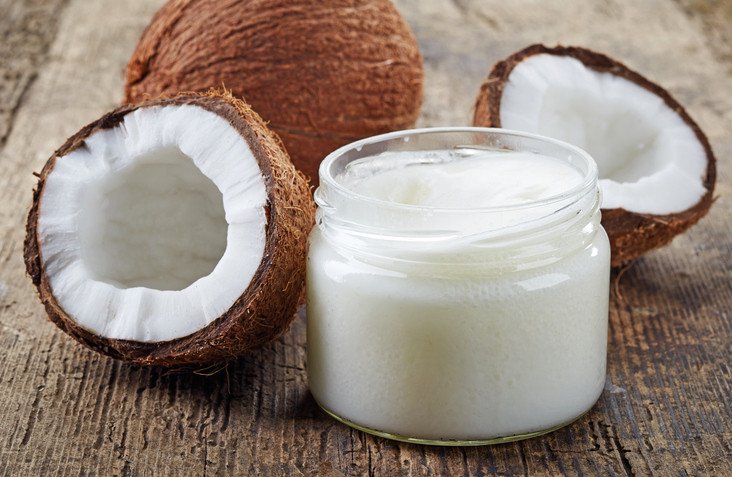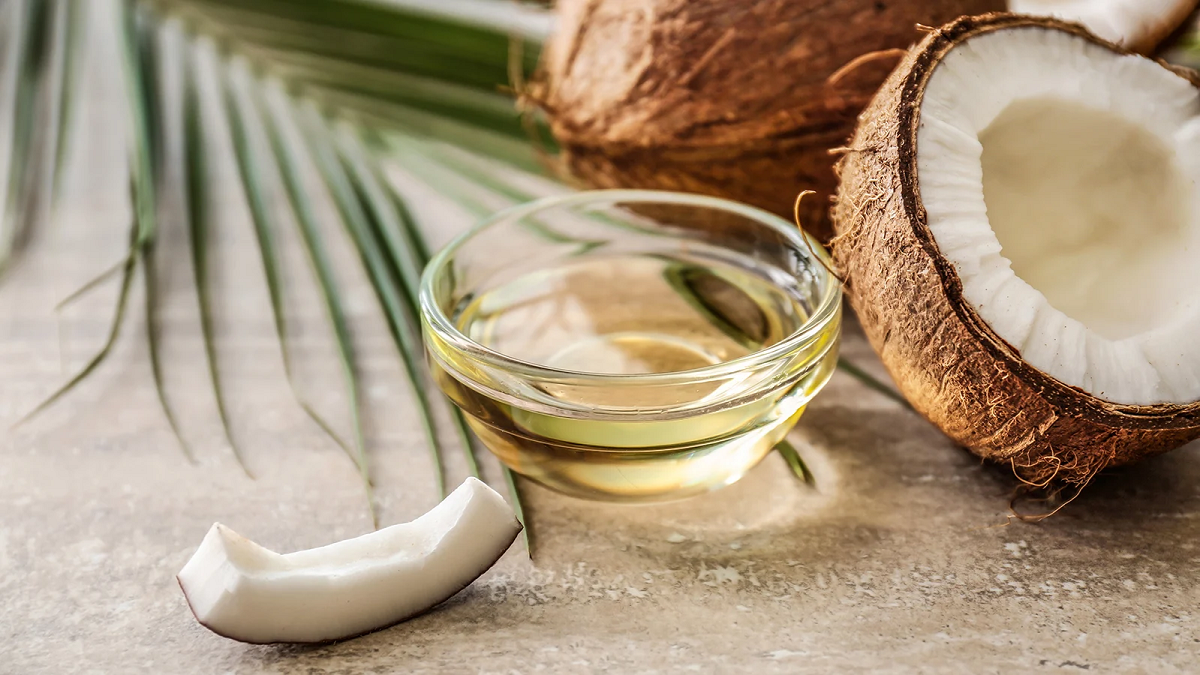Among the potential positive effects of coconut oil are blood sugar regulation, stress reduction, and an increase in good cholesterol. However, more study is required to determine the benefits of frequent consumption of coconut oil. Many people use coconut oil for cooking, and many manufacturers have started utilizing it in packaged goods.
Coconut oil is an ingredient in many items, including coffee, smoothies, fried dishes, candies, and shampoos. Coconut oil does, however, contain a lot of saturated fat. Excessive consumption of saturated fat has been linked to the development of various health disorders, including cardiovascular disease.
Some Advantages Of Coconut Oil

1. Increasing The Amount Of Good Cholesterol
High-density lipoprotein (HDL), often known as good cholesterol, and low-density lipoprotein (LDL), sometimes known as bad cholesterol, are the two different forms of cholesterol. High levels of HDL may improve cardiovascular health, and HDL seems to assist in lowering LDL levels.
According to some research, coconut oil’s medium-chain triglycerides (MCTs) may help raise healthy cholesterol levels. For eight weeks, research participants consumed one tablespoon (tbsp) of coconut oil twice a day.
However, according to another review of studies, MCT may marginally raise triglyceride levels but does not affect cholesterol levels. Consuming coconut oil considerably increases total cholesterol, LDL, and HDL levels. Further research is necessary to understand the effects of coconut oil on cholesterol levels.
2. Healthy Hair
Coconut oil and other natural therapies are popular among those who want to make their hair shinier and prevent it from harm. Some people think that coconut oil can go deeper into the scalp and hair shaft than mineral oils, which might mean that it provides greater nutrition and moisture retention.
Researchers discovered that coconut-based hair oils may help repair damaged hair by making it more hydrophobic, which means it can better keep water out. This water-resistant feature helps stop swelling and breaking that happens when too much moisture gets in. But even though these new results are encouraging, prior studies revealed conflicting outcomes.
In that research, those with comparable hair types who used coconut oil frequently did not see any notable changes in the quality of their hair compared to those who did not. So, the outcomes may be different for different kinds and conditions of hair.
3. Healthy Skin
Some research revealed that applying a coconut extract to human skin could increase the skin’s natural protective barrier. This change might help the skin maintain moisture more efficiently and resist external stresses such as pollution or germs.
Additionally, the study suggested that coconut extract may have anti-inflammatory properties, perhaps helping to calm irritated or inflamed skin disorders such as eczema or dermatitis. These results hint at the potential therapeutic benefits of coconut oil in skincare regimes.
However, despite these positive outcomes, there is currently minimal scientific information indicating the entire spectrum of advantages that coconut oil may give for skin health. Further clinical research is essential to further understand its long-term effects, appropriate use, and whether it is helpful for all skin types and diseases.
4. A Quick Source Of Energy
Coconut oil’s MCTs provide a rapid energy boost. Long-chain triglycerides (LCTs) are encapsulated in molecules known as chylomicrons, which are then carried into your bloodstream by the lymphatic system. Chylomicrons are transported to your liver and other tissues after leaving your lymphatic system, where they are either stored or converted into energy.
Therefore, it takes time to obtain energy from LCTs. MCTs have long been a part of sports nutrition solutions for athletes who need a quick-absorbing energy source.
5. Fights Liver Disease
In a rodent study, researchers evaluated the possible effects of coconut oil on liver function by giving rats with liver disease a high-glucose diet, either with or without the inclusion of coconut oil. After four weeks, the rats who got coconut oil with the high-glucose diet displayed improved liver health markers compared to those who did not ingest the oil.
These effects of coconut oil included lower symptoms of liver inflammation, oxidative stress, and fat accumulation—factors commonly linked with liver damage. The findings imply that specific chemicals in coconut oil, probably its medium-chain triglycerides (MCTs) or antioxidant capabilities, may aid in preserving liver tissue or promoting its recovery.
6. Might Reduce Hunger
One intriguing aspect of MCTs is that they may help decrease food intake and promote feelings of fullness (satiety). This could have to do with how the body processes them. Ketones decrease hunger by either directly affecting the chemical messengers in the brain or by changing the amounts of hormones that cause hunger.
Ketones may be recognizable to you from the recent surge in popularity of ketogenic diets. On a ketogenic diet, people tend to consume a lot of fat but few carbohydrates. Their bodies thus often utilize ketones as fuel.
Despite being one of the most abundant natural sources of MCTs, there is no proof that coconut oil suppresses hunger more than other oils. According to research, coconut oil is less filling than MCT oil.
7. May Prevent Seizures
Keto diets, which are very low in carbohydrates and rich in fats, have long been used to treat a variety of illnesses, including children’s drug-resistant epilepsy. They have been shown to lessen the frequency of seizures. Researchers think that the decrease in seizure frequency in epileptics on ketogenic diets may be due to a shortage of accessible glucose to power brain cells.
Cutting back on carbohydrates lowers blood glucose levels, but eating more fat raises ketone concentrations noticeably. Ketones are an energy source that your brain may utilize in place of glucose.
Adults have recently discovered that adopting modified keto diets, which contain MCTs and a more liberal carb intake to induce ketosis, may help cure epilepsy.
8. Improves Oral Health
Research suggests that using coconut oil as a mouthwash, known as oil pulling, not only enhances dental hygiene but also comes at a reasonable cost. Swishing coconut oil in your mouth like mouthwash is known as “oil pulling.” When compared to a standard mouthwash, oil pulling may considerably lower the amount of dangerous bacteria in the mouth, specifically S. mutans.
The antimicrobial properties of lauric acid are assumed to be the cause of this. Furthermore, coconut oil’s lauric acid combines with saliva to create a soap-like material that helps lessen gum irritation, dental plaque accumulation, and cavities.
9. Fights Alzheimer’s Disease
The most frequent cause of dementia is Alzheimer’s disease. This disorder makes it harder for your brain to utilize glucose as fuel. However, by giving brain cells a different energy source, researchers think ketones might counteract the early symptoms of mild to severe Alzheimer’s disease.
Because of this, some foods, such as coconut oil, have been studied for their possible ability to help manage Alzheimer’s disease. However, more extensive human research is required. Coconut oil may be able to alleviate Alzheimer’s disease symptoms since it contains a lot of MCTs, which raise blood levels of ketones. But further research is required.
Some Controversies Regarding Coconut Oil
The primary objection to the effects of coconut oil is that it contains a lot of saturated fat. A substantial quantity of saturated fat is included in coconut oil. Saturated fats may increase LDL levels, which raises the risk of heart disease and stroke, according to the American Heart Association (AHA).
Less than 10% of daily calories should come from saturated fats, according to the dietary guidelines. Accordingly, a person on a diet of 2000 calories per day should consume no more than 20 grams of saturated fat daily.
According to research, coconut oil may be beneficial to health. In this study, 31 participants underwent a 16-week weight reduction program while consuming either olive oil or MCT oil. They ultimately arrived at the conclusion that MCT could affect CVD risk variables in the same way as olive oil does.
Some individuals took this result to suggest that coconut oil must be good if MCTs can lower total and HDL cholesterol levels. Animals rather than people have often been the subject of brief, small-scale studies that support coconut oil.
The findings haven’t been substantial enough to justify suggesting that consumers use coconut oil instead. More trustworthy findings have come from studies that advocate for a shift to unsaturated fatty acids.
FAQ
Q: Is it healthy to consume a teaspoon of coconut oil every day?
A: Consuming coconut oil as part of a nutritious diet offers many advantages. It’s recommended to limit your consumption, however, since it’s also strong in saturated fats. This implies ingesting no more than two teaspoons daily.
Q: How should my body be treated with coconut oil?
A: After taking a bath or shower, people may use coconut oil as a moisturizer on their bodies. Before using coconut oil on their skin, those with skin issues may wish to see a healthcare provider.
Q: Compared to olive oil, is coconut oil healthier?
A: Coconut oil is not as healthy as olive oil. This is because olive oil has more nutrients and far fewer saturated fats than coconut oil.











